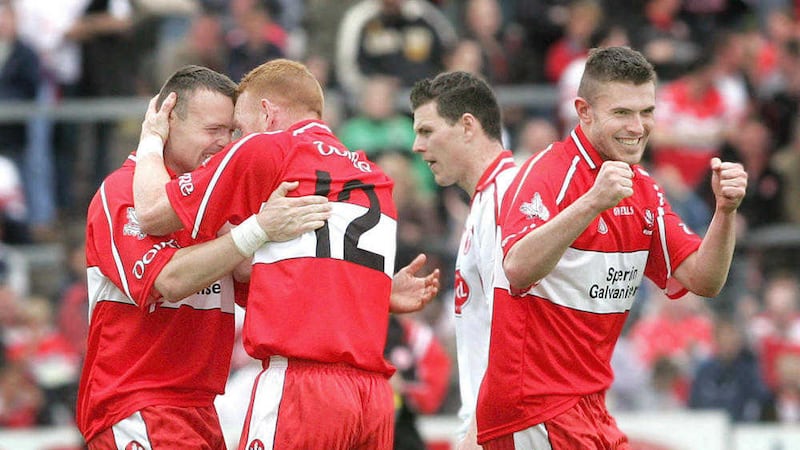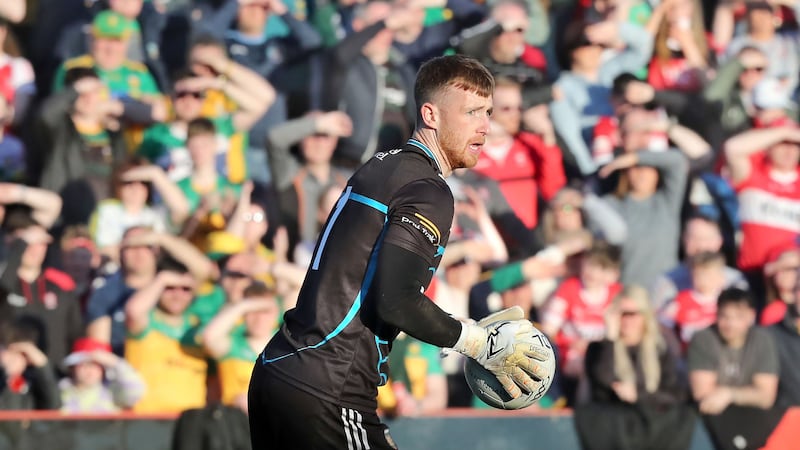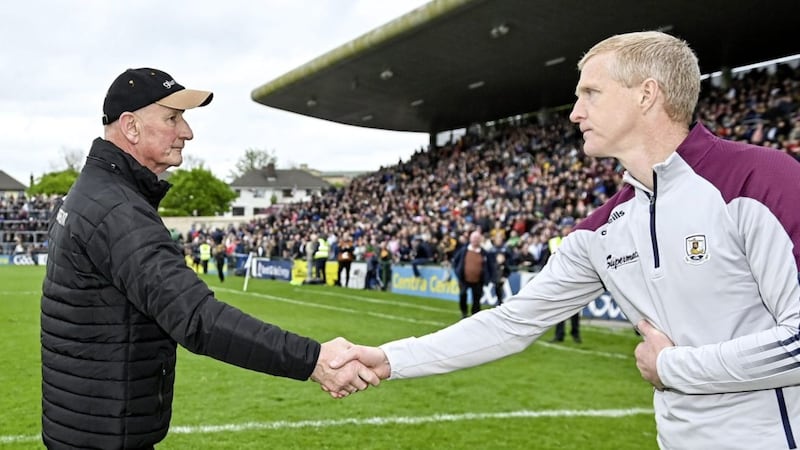FLASHBACK: May 28 2006: Ulster Senior Football Championship first round: Tyrone 0-5 Derry 1-8
MANY people have often wondered what exactly the late, great Eamonn Coleman said to the Derry players before they went out and beat reigning All-Ireland champions Tyrone in the 2006 Ulster Championship first round match at Healy Park.
Oak Leaf manager Paddy Crozier was looking for an extra edge in the build-up to the game. Crozier and Coleman were both Ballymaguigan men and good friends: “Eamonn, if you remember, was sick at the time and I asked him to come in and say a few words,” Crozier recalls.
“The two minutes that Eamonn gave us was the icing on the cake.”
That spring, rookie defender Liam Hinphey had an excellent National League campaign and was nailed on to make his Championship debut against Tyrone on May 28.
Hinphey, though, has no recollection of Coleman’s inspiring address prior to the game. You see, the Dungiven man had a ritual of being sick before games: “Funny, I was asked that before by a friend of mine. He asked: ‘What did Coleman say to the team that day?’ My exact same response was I was in the toilet boking. That’s the truth. I never heard what Eamonn said," Hinphey says.
“When I was younger, I used to throw up before games. That would’ve been part of my pre-game routine. I used to do that every game and, after I was sick, I felt okay to play.”
Crozier liked what Hinphey brought to the table. The-then 22-year-old had a good temperament and was a disciplined tackler. The Derry boss had a specific role in mind.
“I knew I was going to be marking Sean Cavanagh before our league campaign finished,” Hinphey says.
“I had a month or more to prepare for it. It made my role a bit easier because I knew for such a long time and it did help me focus.”
Once Hinphey was given the Cavanagh portfolio, he recruited the help of his team-mate Mark Lynch: “After every training session, I marked Mark Lynch and he would have tried to copy Sean Cavanagh’s dummy,” Hinphey reveals.
“Cavanagh would step inside you and knock it over the bar. So for 10-or-15 minutes, Mark would mirror what Cavanagh would do and I would try to stop him from doing it.
“It was strange,” he adds, “because you were going out to stop someone playing football, a real spoiler for the day.
“In the game itself, the first time Cavanagh got the ball, he threw the dummy and he stepped straight past me and I remember thinking: ‘All that preparation is straight out the window!’”
It was Crozier’s first year in charge of the Derry seniors. It wasn’t all plain sailing for the new man. A month out from the Tyrone game, Crozier and his backroom team quit in protest over a round of club fixtures clashing with Derry’s challenge game against Dublin.
After a tense few days, there was a peace summit between Crozier and county officials, which resulted in the Ballymaguigan man returning to the post: “There was a bit of a row with the county board over fixtures and it probably bonded us a bit more,” Crozier reflects now.
Tyrone and Derry finished just outside the NFL play-offs in Division 1A and 1B as they were known then. The two counties clashed in the U21 Ulster final earlier that season, with Tyrone winning by two points.
“Tyrone had nipped us about a month or six weeks before it in the U21 final. Joe O’Kane and Mark Lynch and those fellas would have been playing,” says Crozier.
“A few Tyrone senior players played that day too. They’d beaten us by two points. We just felt at the time, enough was enough.”
Derry’s recent history had always been punctuated by player withdrawals and in-fighting, but Crozier had every player he wanted available to him. Paddy Bradley, Eoin Bradley and Enda Muldoon were their game-winners in attack; Johnny McBride and Fergal Doherty comprised a mean midfield partnership and Kevin McCloy was at his peak on the edge of the square; while young players Hinphey, Lynch, Barry McGoldrick and Joe O’Kane were entrusted with key roles in Crozier’s team.
But it was still Tyrone they were playing. All-Ireland champions. Cavanagh, Gormley, McMenamin, Dooher, ‘Hub’ Hughes and ‘Mugsy’. Class players in every sector of the field.
Crucially though, Brian McGuigan had suffered a broken leg in a club game against Dromore a month earlier and Stevie O’Neill was also a notable absentee: “We had six months to prepare for Tyrone,” Crozier says.
“We had a good enough National League that year. It was my first year and we’d instilled a lot of belief in the team. And there were three or four new players brought in. There was Joe O'Kane, Liam Hinphey, Mark Lynch and Barry McGoldrick…
“Martin Heaney [backroom team member] had put together a wee motivational DVD. It was wee bits from past Tyrone matches. He did a lot of work behind the scenes. I remember stopping at Ballinderry Bridge that day on the way up to Omagh and showing the players this DVD. After it, they would nearly have walked to Omagh. We’d great belief and great focus. I remember saying to the players before they got off the bus in Omagh - no looking right or left, tunnel vision, just look ahead.”
Few pundits gave Derry a chance of beating Tyrone on their home patch. Even without McGuigan and O’Neill, it was felt the Red Hands would still have enough to progress.
Mickey Harte’s men were in for a nasty shock. Derry ‘parked the bus’ and paralysed the Tyrone attack: “Derry got a lot of men behind the ball,” Tyrone defender Conor Gormley recalls, “and they got some ferocious hits in and it probably did take us by surprise.
“There was no space for our forwards that day. We were building up the pitch and there no gaps, we couldn’t get our marksmen on the ball.”
Tyrone finished the first-half scoreless to Derry’s six points. Worse, Kevin ‘Hub’ Hughes was sent-off after 18 minutes after hitting out at Hinphey. It took Tyrone over 40 agonising minutes to register a point. But even before they got on the score-sheet, the game was probably already won.
“We were deflated at half-time,” Gormley adds.
“We were down to 14 men, it was a low ebb. It was tough for Mickey to turn that around and get us going again. We probably could have gone home at half-time that day.”
Apart from falling for Cavanagh’s dummy in the early stages, Hinphey recovered well and never allowed the Moy man to get another run on him for the remainder of the game.
Another major success for the Derry management team was 19-year-old Joe O’Kane quelling Brian Dooher’s threat. In the 48th minute, the defending All-Ireland champions were put out of their misery when Enda Muldoon rippled Tyrone’s net.
Gormley recalls: “I suppose the longer the game went on, you felt the pressure growing. The longer they kept us scoreless, the more confidence they gained. They were in control that day. They got a goal late on.
“I remember Paddy Bradley cut inside, I went to tackle him and left Muldoon open and it was my man who scored the goal. It was just a bad day all round. Derry deserve credit. They came with a gameplan and it worked. Tyrone and Donegal have got a lot of stick for playing a blanket defence, but there were other teams that used it as well, like Derry did. It wasn’t just us that used it.
“You could see how they celebrated that day. It was a culture shock for us that maybe we had to think a bit deeper about facing teams that played against us like that.”
“People used the phrase: we out-Tyroned Tyrone,” says Crozier, 10 years on from that shock victory.
“We always felt it would be a low-scoring game because we’d copied the way Tyrone were playing, I guess. To go 15-against-15 wasn’t the way to go. We just had to bide our time, but never in our wildest dreams did we think Tyrone wouldn’t score in the first-half. The more the half went on, the more they tried impossible shots at times and it started going against them a little bit. Of course, Brian McGuigan and Stephen O’Neill were injured and didn’t play, which was a big advantage for us.”
Injuries to key players determined Tyrone would have a short enough summer in 2006. They fell to Laois in the Qualifiers, while Derry lost to Donegal in the Ulster semi-finals a month later and were knocked out of the All-Ireland series by Longford.
“At the end of the day, Tyrone was our All-Ireland final,” says Crozier.
“We took our eye off the ball after that game. Donegal beat us and they probably prepared for us the way we prepared for Tyrone.”
Hinphey, who enjoyed a successful dual career with Derry, retired from inter-county hurling at the end of the 2015 season. Last month, he sat down to watch Tyrone beat Cavan in the Division Two final.
“Cavanagh,” he says, “was such a great player. Funny, I was watching the league final and he scored a point at the end of that game and I thought: ‘He’s still doing it.’ He just seems to be the best footballer in Ireland for the last 15 years.”
HOW THEY LINED OUT IN 2006
Tyrone: P McConnell; R McMenamin, C McGinley, C Gourley; D Harte (0-1), C Gormley, P Jordan; C Holmes, P Donnelly; (0-1, ’45); B Dooher, S Cavanagh, R Mulgrew; R Mellon, K Hughes, O Mulligan (0-2 frees); Subs: J McMahon (0-1) for Holmes (h/t), M Penrose for Mulgrew (h/t), E McGinley for Mellon (53), D Carlin for Gourley (53), B Meenan for Cavanagh (66)
Derry: B Gillis; K McGuckin, K McCloy, F McEldowney; L Hinphey, P McFlynn, J O’Kane (0-1); J McBride, F Doherty; M Lynch, B McGoldrick, J Diver, E Muldoon (1-3, 0-3 frees) , P Bradley (0-3, 0-1 free), E Bradley (0-1); Subs: G Donaghy for McEldowney (43), F Crossan for O’Kane (57), D McIlvar for Diver (70)
Referee: D Coldrick (Meath)
Attendance: 18,150



